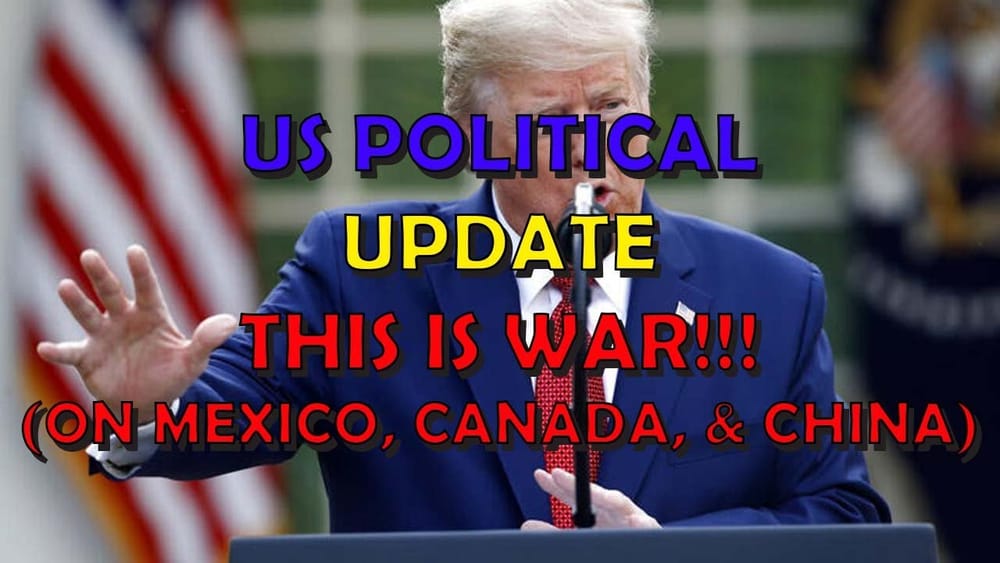US Politics: THIS IS WAR!! On Mexico, Canada, & China
Table of Contents 📖
"Bullies are okay if I benefit from the bullying."
Hello Team
🎦 00:00-00:19⏩
Jonathan introduces the video as focusing on US politics and the potential for a global trade war. He intends to share his initial thoughts on the incoming Trump administration's threats to impose tariffs on China, Mexico, and Canada.
Return to top⤴️
US Economy Pre-Trump
🎦 00:19-01:18⏩
Jonathan points out that the US economy was performing very well before Trump took office. He cites strong economic metrics, a robust recovery from the COVID-19 pandemic, and record stock market performance as evidence.
Return to top⤴️
Tariffs: An Overview
🎦 01:18-03:57⏩
Jonathan argues that imposing across-the-board tariffs is generally a bad idea as it leads to inflation. He explains that tariffs are essentially a tax on consumers, not the targeted countries, as importers raise prices to cover the added cost. While he acknowledges that strategic tariffs can be useful to protect specific industries, he believes widespread tariffs harm the US economy more than the economies of the targeted nations.
Return to top⤴️
China Tariffs
🎦 03:57-05:18⏩
Jonathan acknowledges that imposing tariffs on Chinese goods could align with the incoming Trump administration's view of China as an adversary rather than a competitor or partner. However, he disagrees with this approach, arguing that a trade war would ultimately harm US consumers.
Return to top⤴️
Trade Wars: A History of Pain
🎦 05:18-05:29⏩
Jonathan reiterates his belief that trade wars are detrimental and rarely have positive outcomes.
Return to top⤴️
Mexico & Canada: Allies Targeted
🎦 05:29-09:04⏩
Jonathan criticises the Trump administration's decision to impose a 25% tariff on Mexican and Canadian goods. He argues that this decision is illogical and will likely lead to retaliatory measures from both countries, sparking a trade war. Jonathan uses an analogy of a neighbour (representing the US) punching another neighbour (representing Mexico or Canada) in the face over a minor issue (representing trade disagreements), highlighting the disproportionate and aggressive nature of Trump's approach.
Return to top⤴️
Canada's Response
🎦 09:04-09:04⏩
Jonathan discusses Canada's response to the tariff threats. He notes that while Prime Minister Trudeau has adopted a measured and diplomatic stance, there is growing concern and a sense of urgency within the Canadian government, as evidenced by the establishment of a "war room" to address the situation. Jonathan emphasises that Canada will not passively accept the tariffs and is prepared to retaliate, potentially escalating the situation into a full-blown trade war.
Return to top⤴️
Trump's Zero-Sum Game
🎦 12:40-15:33⏩
Jonathan critiques Trump's transactional approach to international relations, arguing that it is based on a zero-sum game mentality where one country's gain is inherently another's loss. He contends that this approach is flawed and unsustainable, especially in the context of global trade, where cooperation and mutually beneficial agreements are crucial for long-term prosperity. Jonathan believes Trump should prioritise building alliances and seeking common ground with countries like Mexico and Canada, rather than viewing them as adversaries to be exploited or defeated.
Return to top⤴️
The Dangers of Economic Bullying
🎦 15:33-18:14⏩
Jonathan draws a parallel between Trump's economic policies and Russia's military aggression, characterising both as forms of bullying. He expresses concern that Trump's actions will ultimately harm the US economy, potentially leading to job losses and economic hardship for American citizens. While part of him feels that Trump and his supporters need to learn a lesson about the consequences of such aggressive policies, he also acknowledges the potential negative impact on the livelihoods of ordinary Americans.
Return to top⤴️
Wrap Up
🎦 18:14-18:39⏩
Jonathan concludes by expressing his worry over the potential long-term consequences of Trump's populist, knee-jerk approach to trade and international relations. He believes these policies are ultimately detrimental to the US's best interests.
Return to top⤴️

